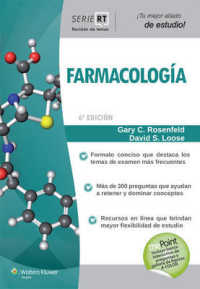- ホーム
- > 洋書
- > 英文書
- > Business / Economics
Full Description
This thought-provoking volume presents essays on the foundations of non-equilibrium economics, i.e. the principle of circular cumulative causation (CCC). This work presents empirical research on how the interplay of technology's increasing returns to scale, institutions, resources, and economic policy leads to virtuous circles of economic growth and development, but also to vicious circles of social and ecological degradation. In particular, evidence is provided for the important role of the "development state" and strategic trade policy, economies of large-scale production in manufacturing, the regional level of development and community-based resource management regimes. While demonstrating CCC's strength in generating empirical research, the book also provides insights into its philosophical foundations and intellectual history. Several essays trace the roots of this full-fledged theoretical framework back to Adam Smith, Classical Political Economy, Thorstein Veblen, Gunnar Myrdal, K. William Kapp and Nicholas Kaldor.
As the most comprehensive collection of the growing body of CCC research to date, this book also reflects the emergence of an economic paradigm for understanding economic dynamics and for crafting viable development strategies for the 21st century. The volume will be of great interest to scholars of growth and development economics, institutional and evolutionary economics, political economy, and Post Keynesian economics from undergraduate to postgraduate research levels.
Contents
1. Introduction Sebastian Berger 2. On Competing Views of the Importance of Increasing Returns, Cumulative Causation and Path-Dependence John McCombie and Mark Roberts 3. Cumulative Causation in Northeast Asian Post-War Industry Policy Phillip Toner and Gavan Butler 4. Cumulative Causation and Industrial Development: The Regional Stage George Argyrous and Geoff Bamberry 5. Nicholas Kaldor and Cumulative Causation: Public Policy Implications Ric Holt and Steven Pressman 6. The Principle of Circular and Cumulative Causation: Myrdal, Kaldor and Contemporary Heterodox Political Economy Phillip Anthony O'Hara 7. Circular Cumulative Causation à la Myrdal and Kapp Sebastian Berger 8. Utilizing the Social Fabric Matrix to Articulate Circular and Cumulative Causation for Conceptual Conclusions F. Gregory Hayden 9. Unnatural Depletion and Artificial Abundance: A Circular Cumulative Causation Analysis of Salmon Fisheries and Some Implications for Political Ecological Economics Sebastian Berger and James Edward Glavin IV 10. Circular and Cumulative Causation in the Classics: Anticipations, Family Resemblances, and the Influence of Post-Keynesian Economics Mathew Forstater and Michael Murray 11. Continuity, Continuousness: The Chain of Ideas Linking Peirce's Synechism to Veblen's Cumulative Causation John Hall and Oliver Whybrow 12. Cumulative Causation and the Origin of Money Alla Semenova








